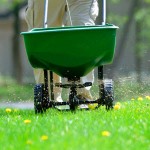
by Blake Thaxton | Sep 13, 2012
As of January 2014 all companies applying fertilizer, commercially “for hire”, will be required to hold a fertilizer applicators license. In order to obtain this license you must first become GI-BMP certified.
2014 isn’t that far away. Take the time to attend a class this fall. Don’t wait to the last minute and have to scramble to find a training close to home.
Upcoming Training opportunities in the panhandle:
September 25, 2012 in Milton 850-623-3868 – $20 agenda
October 25, 2012 in Crestview 850-689-5850 – $20 agenda
November 9, 2012 in Cantonment 850-475-5230 $30
(To register call the numbers next to the event you would like to attend)
What is the GI-BMP program?
- The GI-BMP workshop is designed to provide training in Best Management Practices (BMPs) for anyone working in the lawn, landscape, pest control, or municipal grounds areas.
- The Best Management Practices are focused on reducing non-point source pollution resulting from fertilization or pesticide application.
- At the end of this training you will be given a post-test to determine knowledge learned. If the post-test is successfully completed, you will be mailed a Green Industries BMP certificate of completion.
- Some cities & counties require this certification before you can bid on jobs or have commercial customers.
- If you also need pesticide CEUs, get your signed CEU attendance form before you leave the class.
by | May 10, 2012

Eddie Powell
Extension Horticultural Courtesy Agent I
Walton County
pep5@ufl.edu
With spring in full swing many Florida homeowners are gearing up to grow their own vegetables. The most frequently asked question this time of year is, “why do I need to fertilize my soil?” The answer is simple – – not all nutrients are present in the right amounts to support good plant health. North Florida is a prime example of an area lacking certain nutrients, since the soils in this area are generally infertile and acidic. Therefore, ample amounts of lime and fertilizer must be applied to the soil for adequate plant growth. If this is not done then the crops will suffer from inadequate plant growth and food supply.
Most vegetable crops grow and perform best at a pH range, 6.0-7.0. A soil sample must be taken to determine soil pH. Feel free to bring one of those samples by your local University of Florida Extension office for your soils pH results. Now if the pH extends far below or above this range, then crop productivity will be significantly reduced. This happens because the crop cannot utilize the fertilizer properly. In other words, this causes the plant to use too much of some nutrients (like manganese, zinc, and iron) that are required in very small amounts and too little of some nutrients (like nitrogen, phosphorus, and potassium) that are required in larger amounts. The plant system becomes upset so to speak and does not function well and some plants may even die.
To avoid having your crop suffer because of a lack of fertilizer, contact your local University of Florida Extension Agent and ask he/she to help you select the best kind of fertilizer for your crop. After you have selected the correct fertilizer, make sure to ask your agent to assist you with following: to figure the correct amount to be applied to the area where you plan to grow your vegetable crops and also how to apply the fertilizer to the soil so that your plants will use it properly for an excellent crop yield.
Things to remember:
To keep your soil pH range between 6.0 -7.0 so that your crop can uptake the fertilizer properly and make sure to apply the correct amounts of fertilizer to the soil so that your plants will not suffer but produce high quality produce.



